Khinkali, traditional Georgian dumplings are the perfect appetizer or snack food. Click here for meat, potato, and cheese dumpling recipes, plus a complete how to fold and boil the dumplings as well.
On my way to Georgia, I was on a mission. I had researched the local dumpling, khinkali, and was fascinated by it. I love the way it looks, the way people eat it. I definitely wanted to learn how to make it, but could not find a cooking lesson advertised anywhere.
Jump to Recipes
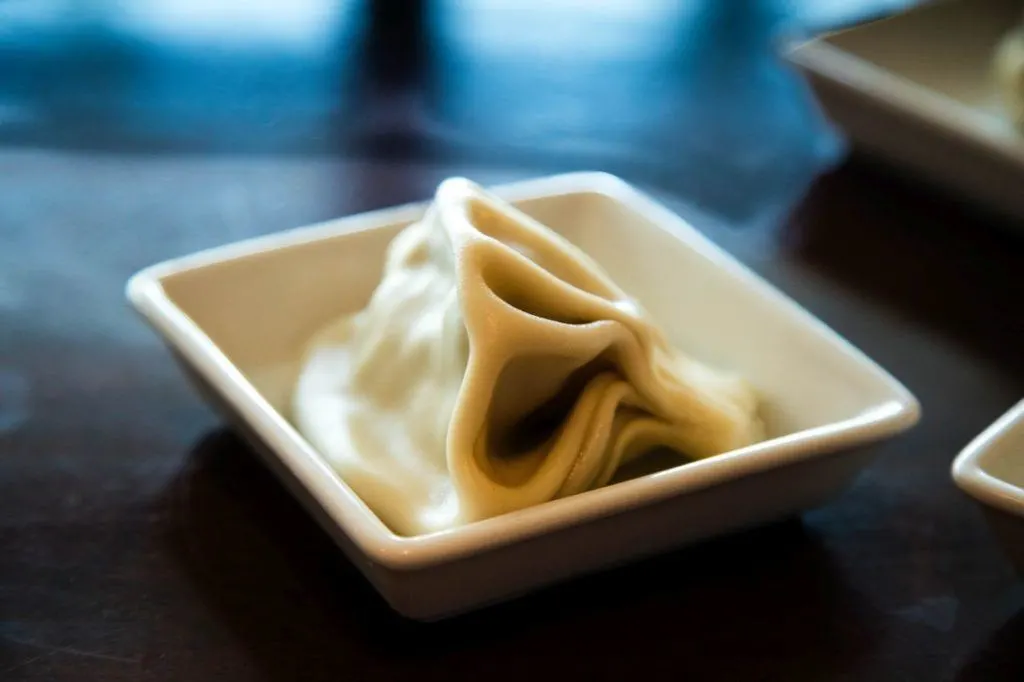
Upon our arrival, the first thing we did was pick up our rental car. Jim always makes those reservations, and I didn’t realize that it wasn’t just a rental place, it was a full on tourist agency.
While we sat and did all the paperwork, which was more time consuming than usual since we were taking the car to Armenia as well, I asked one of the agents if they knew of a place I could learn how to make khinkali. To my surprise she gave me the name of a restaurant in Telavi to call. Supposedly they would teach me.
The Search for Khinkali – Dumplings from Georgia
Once we had the car rental straightened out and were on the road we decided to make Telavi, about an hour north of Sighnaghi, our first stop. I wanted as much time as possible to be able set up a cooking lesson, and since we had no reservations anywhere, I figured we would let this be our first goal and see what happened.
Upon our arrival, we checked into our guesthouse. The owner’s son spoke a little English, and when they asked me if I needed anything I asked if he would call the restaurant for me and see if they could teach me how to make dumplings.
After a long conversation, he told me they would and I could come right over. I was amazed that it was happening so fast. I figured I’d have to wait a day or two but was overjoyed that we could do it right then.
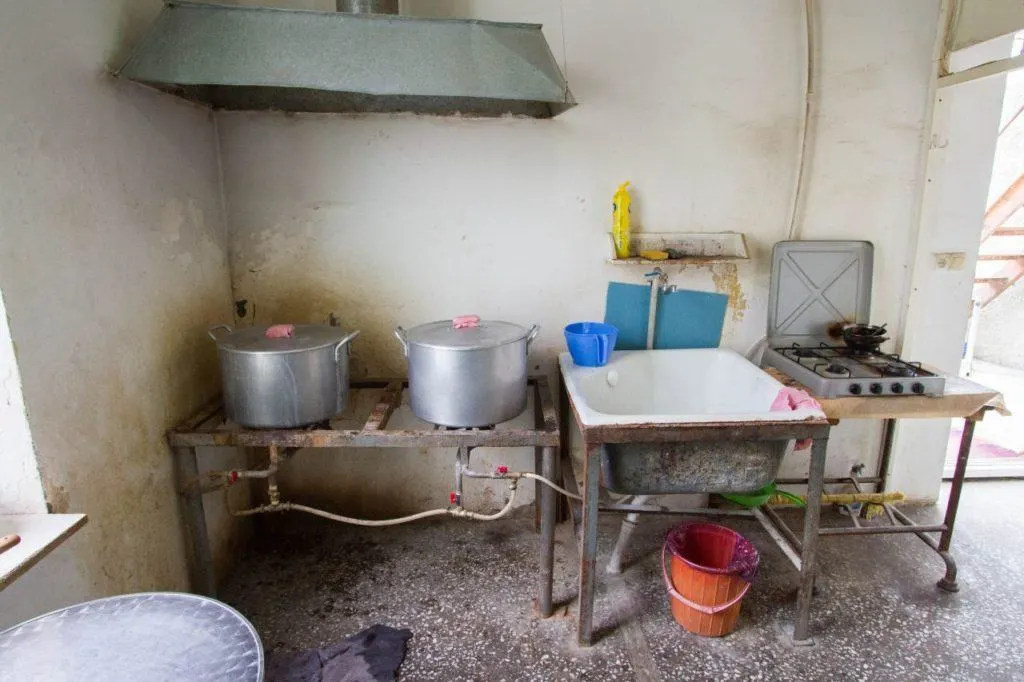
Into the Kitchen
The restaurant, Restorani Telavi, was not in the center of town and when we arrived there was only one table with customers at it. The guesthouse guy walked us in and introduced us and then took off. No one really spoke English except a waitress who was only there for a few days picking up some extra money as she traveled around her country. How lucky was that?! Zaza went and talked to the folks in the back for about five minutes and then came back and explained to us that we could go back into the kitchen.
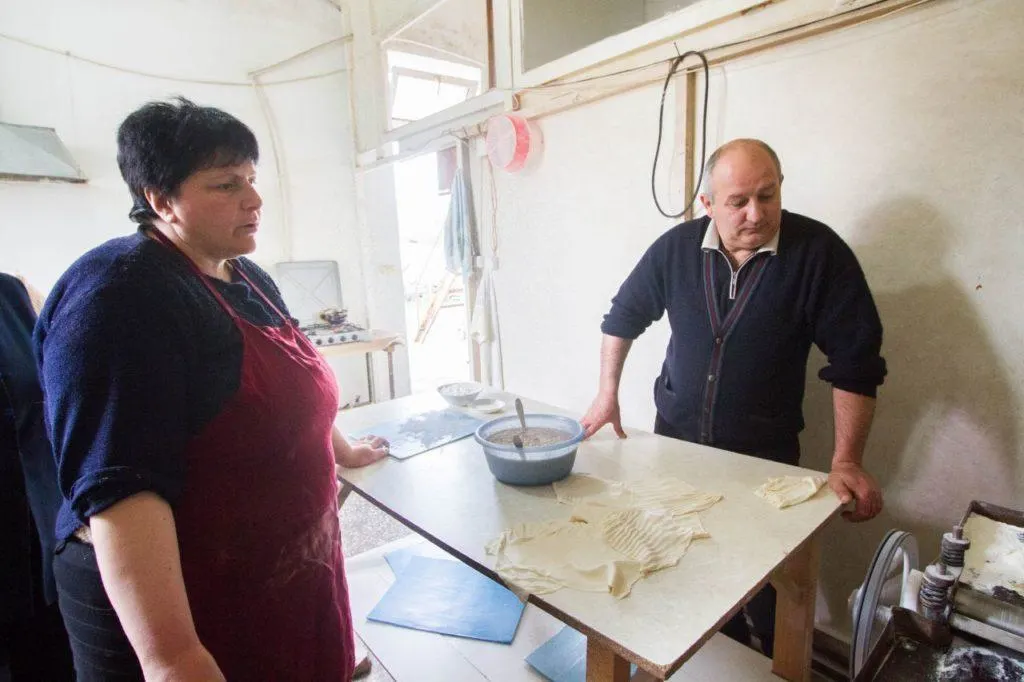
Let the Lessons Begin!
In the small, spartan kitchen we met Marta and Anna. Marta had been the chief cook and khinkali maker for a long time and had even mangled her hand in the dough pressing machine.
She was a large, imposing woman who really didn’t seem pleased at first that we were invading her territory, but within minutes of us fumbling around she really warmed up to us! The cooking lesson was less of a cooking lesson than it was a folding the dumpling around the filling lesson.
The dough and the filling was already made, but she did tell us how she did it. Then she showed us how to press the small sheets of dough in the pressing machine and then how to hold, wrap, and fold the layers to make the delicate shape that looks like a purse cinched up holding its treasure within.
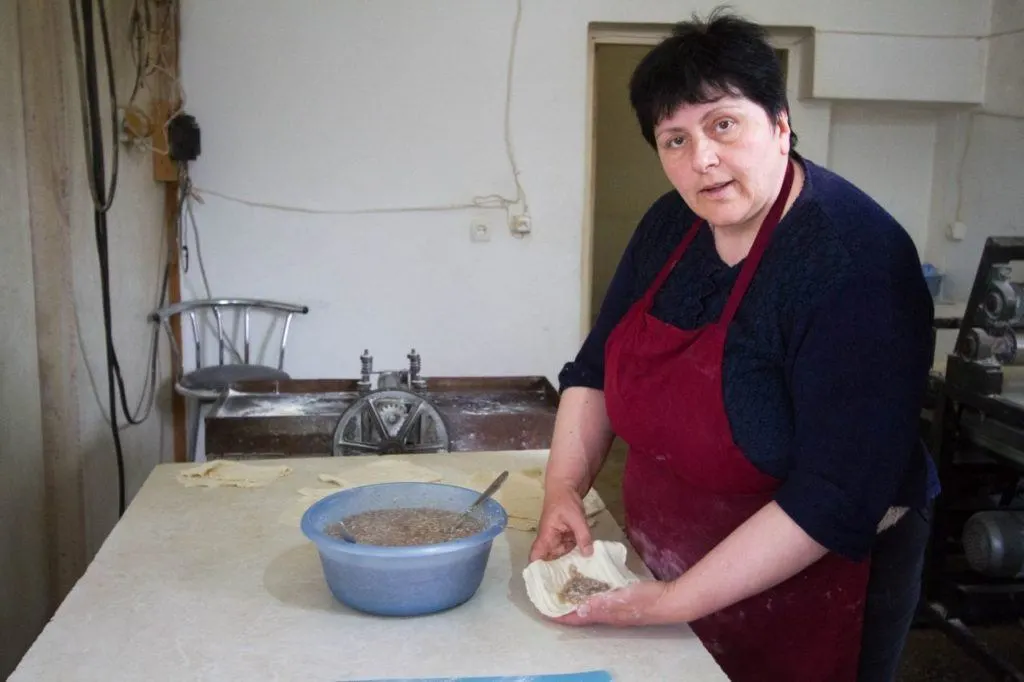
Using the two dough pressing machines were a little daunting as the rollers tend to grab the dough and do with it as it pleases. Yes, Marta could make the shape she was looking for in her sleep, but I tried time and time again and never seemed to quite grasp the trick.
The same can be said with the folding of the pleats. These ladies picked up a sheet of dough, splashed in some broth and meat and within seconds produced a perfect little pouch, with even pleats, and a nice little hat on top. After too many tries to count, I figured I would never quite get the hang of it, so I decided right then and there that I would spend my energy perfecting the eating of khinkali, something that speaks much more to my personal talents.
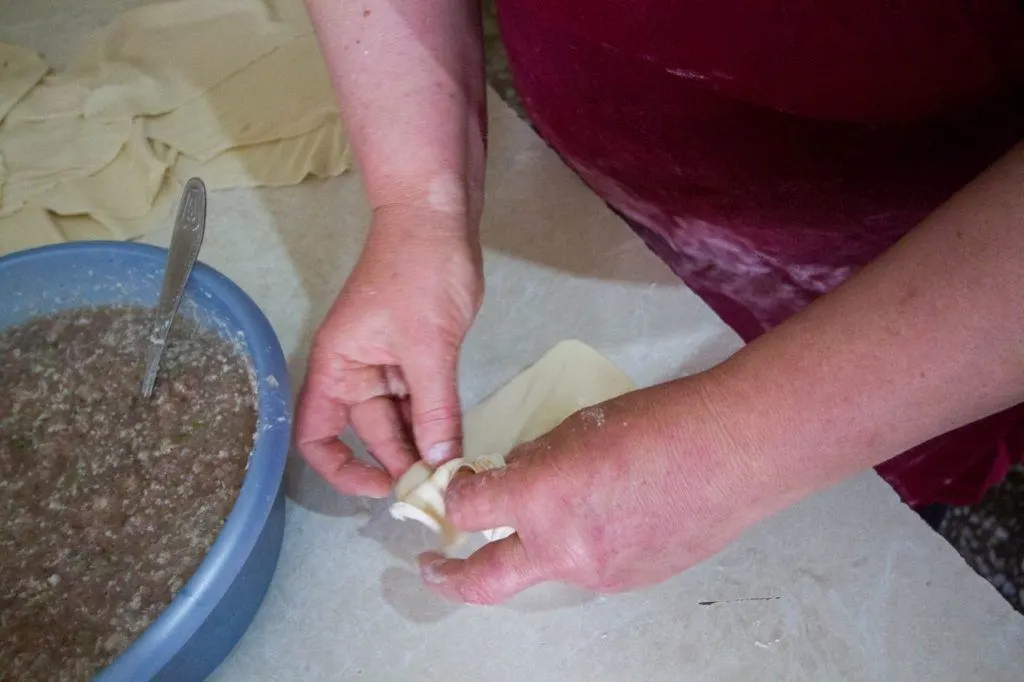
When I asked my instructors, during the critical part of the folding lesson, what their favorite food was, they hesitatingly answered “maybe khinkali” and now I know why. It takes a long time to make those delectable little pouches, and I’m sure they don’t have dough pressers at home to facilitate the process. Even though I started my dumpling project trying to get the stories of the family all being together in the home while they made these time-consuming specialties, nowadays they just don’t have as much time as they possibly did in the past.
Into the Pot With You!
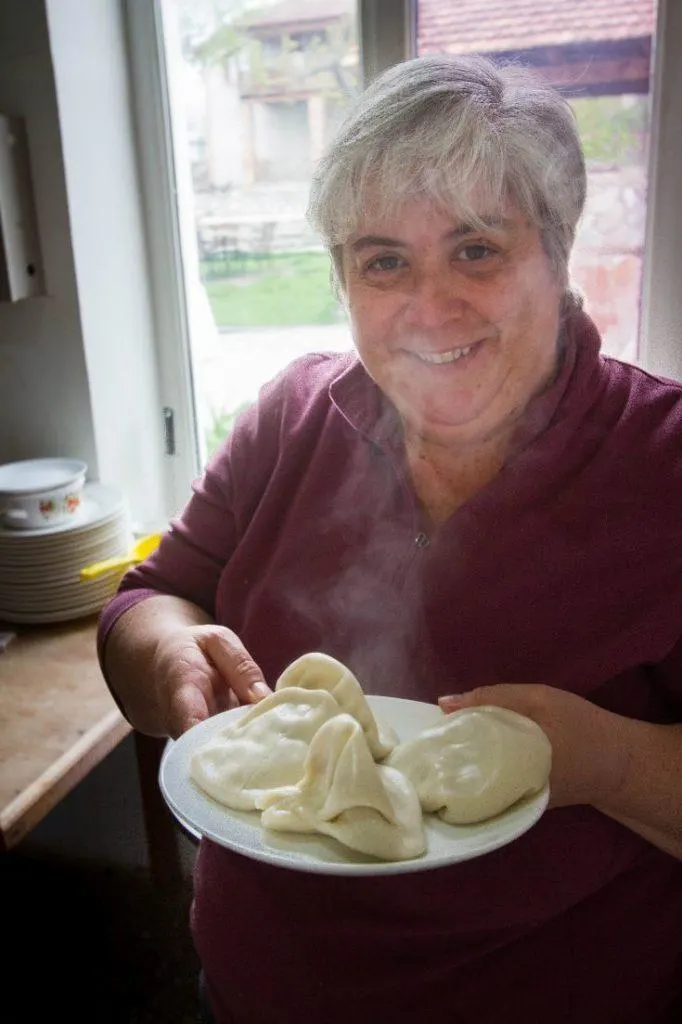
Now it was time to cook our little packets of meat and broth. That is one great reason that khinkali are so tasty. Most other dumplings do not contain their own liquid, but watch out with khinkali, since you eat them straight out of the pan, that liquid is hot and so delicious (you definitely don’t want to lose a drop)!
In the pot Marta dumps the khinkali and she takes a huge wooden ladle with handmade holes bored through it to stir bubbling cauldron. I loved that massive, wooden spoon. I asked her about it and she said that “it is special” so I wasn’t going to be able to find one to buy. But I love a challenging mission so guess what? For the rest of the time, I was on quest to find the perfect Georgian souvenir, a khinkali spoon.
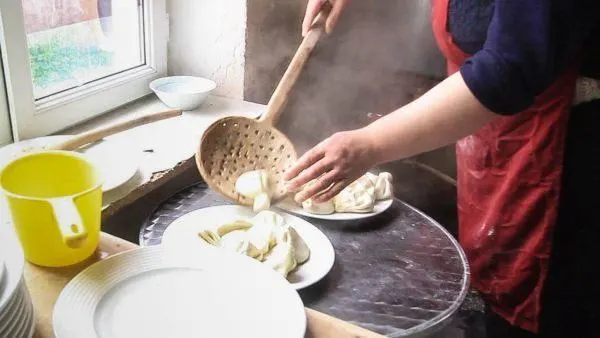
The khinkali were done, Marta unceremoniously dumps them on a plate and Jim and I head back out to the dining room to eat them all. Delicious!
Facts and How to Eat Khinkali
- Khinkali originated in Georgia’s mountain regions and has spread throughout the Caucasus countries
- There are many different fillings to include, potatoes, cheese, lamb, beef, and mushroom
- Khinkali are always eaten by hand, never with knife and fork
- The first bite is taken carefully and all of the broth is slurped out with it
- Hold the khinkali by the top knot, or hat, which is never eaten but left on the plate to show how many have been consumed
- Restorani Telavi can be found on Giorgi Leonidze Street, about half way up the road (sorry no address)
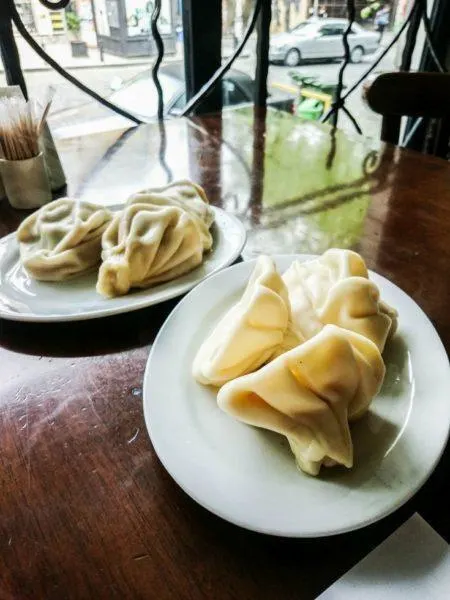
How to Make Meat, Potato, or Cheese Khinkali
First you need to make the dough, which is the same for any of the fillings. Then make the fillings, stuff, boil, and eat! There are a multitude of fillings you can use. We loved all of them. We’ve included the recipes for our favorites.
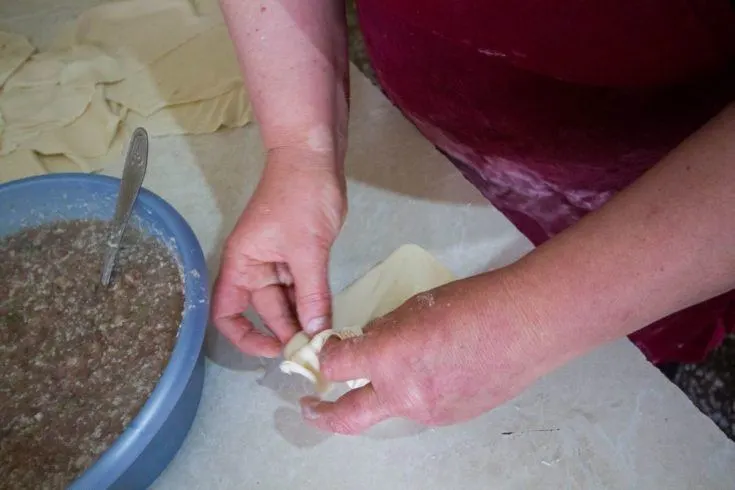
Simple Dough for Khinkali Dumpling
Rolled out as flat as possible, this dough can be used for many different dumplings around the world, not just Khinkali.
Ingredients
- 4 cups unbleached white flour
- 1 teaspoon salt
- 1 cup warm waterMix ingredients, knead for about five minutes, and let stand for about 30 minutes while you make the fillings.
Instructions
- Mix ingredients, knead for about five minutes, and let stand for about 30 minutes while you make the fillings.
- When filling is ready, cut into rounds.
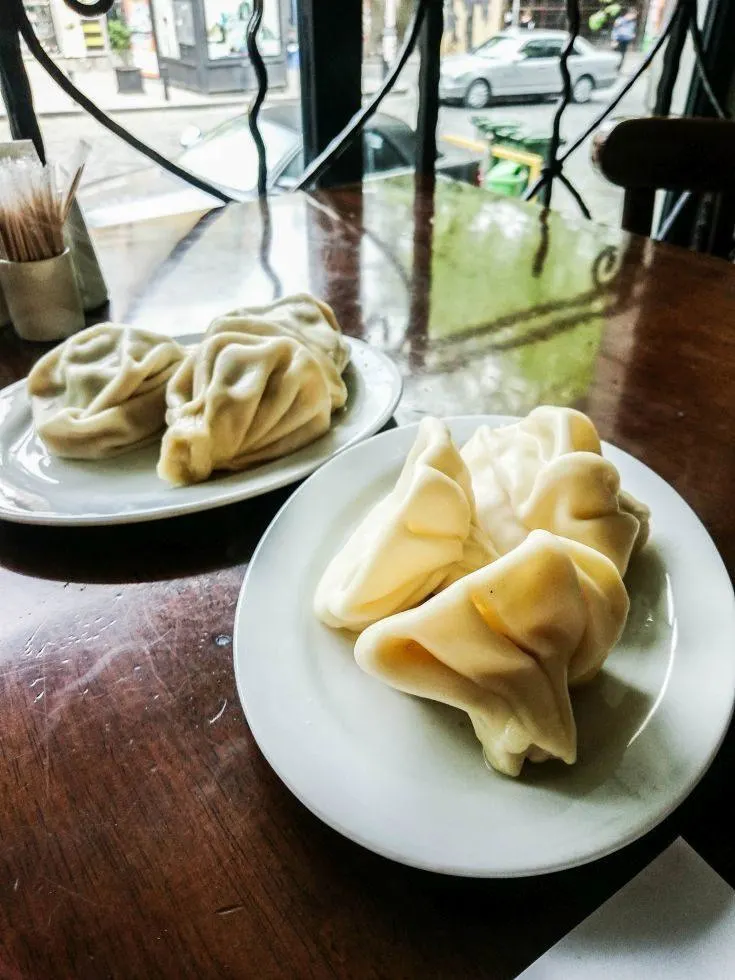
Khinkali with Meat Filling
Delicious meat filled soup dumplings, these purse-shaped packets of goodness are traditional Georgian staples.
Ingredients
- 1 pound ground beef (fatty)
- 1 pound ground pork or lamb (fatty)
- 1 teaspoon freshly ground black pepper
- 1 teaspoon salt
- 2 tablespoons finely chopped cilantro
- 1 teaspoon ground caraway seed or dried fenugreek leaves
- 1 1/2 teaspoons crushed red chili flakes or cayenne pepper
- 2 small onions, peeled and diced
- 1 cup water (or stock), warm
Instructions
- Add all ingredients except liquid and mix thoroughly. The liquid should be warm, not too hot.
- Add the water or stock little by little until all of it is absorbed. The wetter the mixture the more broth will be in the dumpling.
- Take rounds of flattened dough, plop 1 tablespoon of mixture on, and pinch to close.
- Boil for 10-15 minutes. They are done when they float to the surface.
- Serve hot.
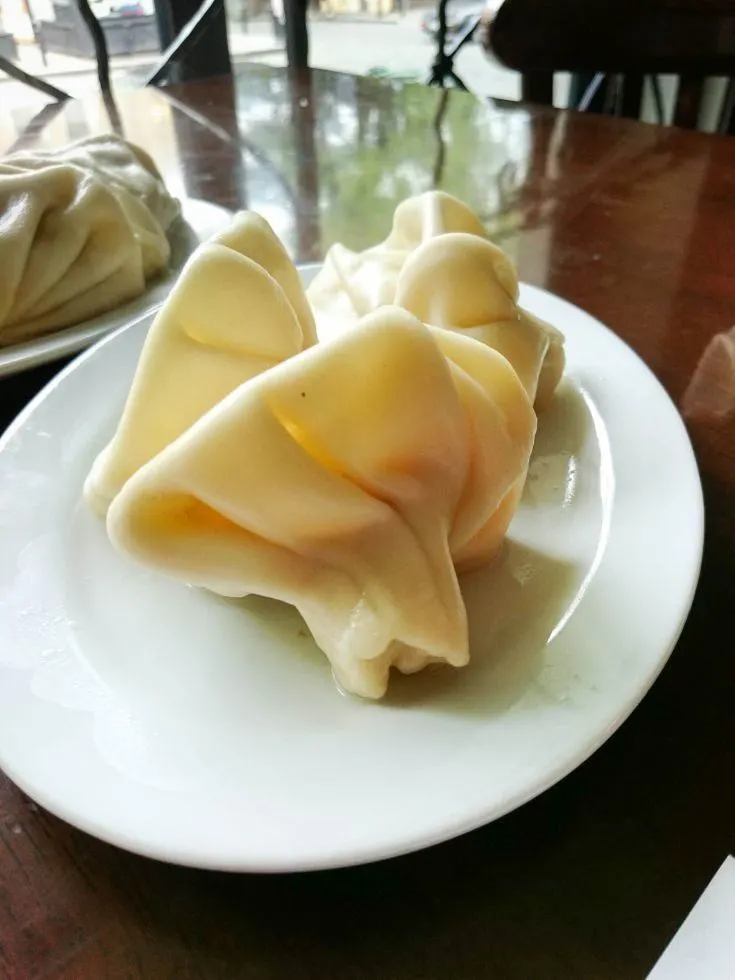
Potato Filling for Khinkali Dumpling
Potato filling dumplings just make you feel like you are eating a hug from grandma. Yum!
Ingredients
- 6 potatoes, peeled and boiled and put through ricer
- 2 tablespoons butter
Instructions
- Mash and add butter, then let cool until you can touch the mixture.
- Take rounds of flattened dough, plop 1 tablespoon of mixture on, and pinch to close.
- Boil for 10 - 15 minutes. They are done when they float to the surface.
- Serve hot.
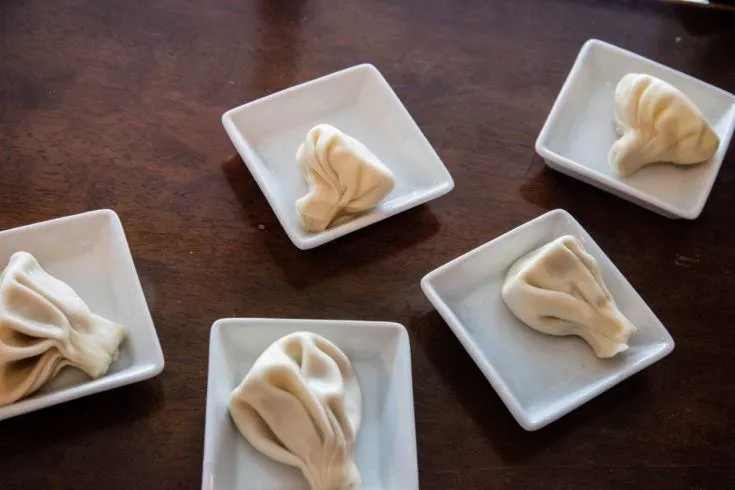
Cheese Filling for Khinkali Dumpling
Feta cheese dumplings are a great way to start any meal.
Ingredients
- 8oz of feta cheese (unless you can find Georgian cottage cheese)
- 1 tbsp butter, softened
- 1 tsp Parsley, to taste
- 1/4 cup milk, just enough to keep it held together when mix
Instructions
- Whip cheese, parsley, and butter together with a little milk. It just needs to hold together enough to stay on a spoon.
- Take rounds of flattened dough, plop 1 tablespoon of mixture on, and pinch to close.
- Boil for 10-15 minutes. They are done when they float to the surface.
- Serve hot.
Wrapping, Pleating, and Boiling the Dumplings
Make sure you have a large pot of boiling, salted water.
With your rested dough, roll out to about 1/4 inch thick and cut out 25 circles with a glass or cookie cutter. Each round then must be further rolled to a paper thin thickness about the size of a small tortilla (six inches in diameter).

Scoop your chosen filling onto the circle, and pull up to pleat at the top. Keep folding until you have made it all the way around and you have excess dough at the top. Press the top of the folds together to seal. After it is sealed completely, pinch off the excess dough at the top. There will be a little “hat.”
Drop about half of your dumplings in the rapidly boiling salted water for about 12-15 minutes, stirring frequently with a large spoon. The dough should be cooked through and springy when finished, floating upside down in the water.
Now To Eat the Dumplings – The Best Part
Khinkali are best served hot, and to eat them you pick up the dumpling holding the hat closest to your palm. For meat dumplings, take a small bite and slurp out the broth, then gobble down the remainder of the dumpling.
Conclusion
Khinkali are a ubiquitous and important food in the Republic of Georgia. We loved them so much that we found someone to teach us how they are made. We’ve included our experience and recipes for meat, potato, and cheese khinkali.
Author Bio: Corinne Vail is a travel photographer, food lover, and a perpetual traveler who has been travel writing for over 14 years. For many years she lived overseas in Germany, Japan, Turkey, South Korea, and the Netherlands teaching the children of the US. military. She’s visited over 90 countries, and she’s not stopping anytime soon.
Pin Khinkali Recipe
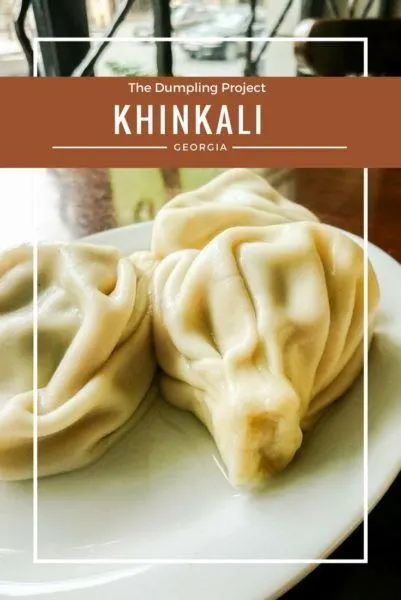
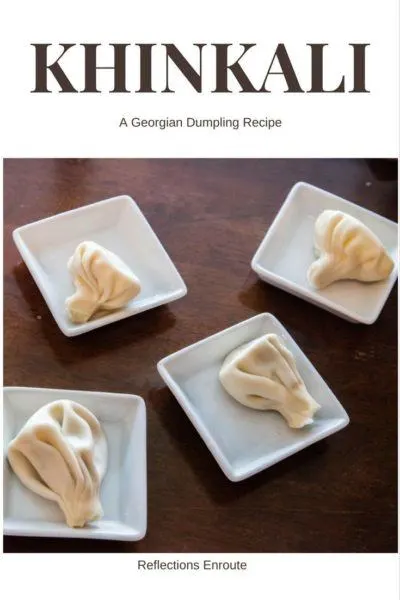

Kath Amor
Friday 16th of February 2024
Love the story. Have made imeruli cheese and looked up ways to use it. I WILL BE make these dumplings!
Corinne Vail
Friday 16th of February 2024
Oh, they are so good. But, let me warn you, the folds can be difficult. Enjoy!
Hagen Mohr
Saturday 14th of March 2020
I very much enjoyed the recipe; the cheese filling is very flavorful and easy to make.
Corinne Vail
Saturday 14th of March 2020
Thanks Hagen. We love eating Khinkali!
Agness of Run Agness Run
Tuesday 24th of January 2017
I am so happy I stumbled upon this recipe! Can't wait to surprise my family. Thanks for the recipe, Corinne!
Corinne Vail
Wednesday 25th of January 2017
Agness, Are you good at folding them? That's my downfall! Good luck!
Rhonda Albom
Monday 3rd of October 2016
Thanks for the recipe. They look good and worth a go at making.
Corinne Vail
Monday 3rd of October 2016
Rhonda, If you do, please tell me how it went. I've got to try them at home still, too.